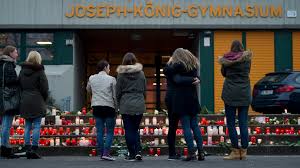Yes, and you may have heard of Stubbornness Is Virtue (SIV) week, self-declared and self-extended, in which I have granted myself executive authority to Get Stuff Done, no matter how ‘last month’ it might be. This week, we have heard more from the investigation of the Germanwings air disaster, more on the sordid rehearsal that CopilotBoy did for his all-too-sadly-inclusive march into oblivion. I wrote, quite bitterly, about this unnameable coward earlier, but here was my first (pre-empted) reaction, now finally finished — rather like my lengthy high school career.
I was in high school for a LONG time.
It was five years, at first, back in the era of Ontario’s Grade Thirteen. Five years of education and some factory/retail time later, I did some teacher prep-time in a few southern Ontario elementary schools, and then resumed what seemed to be the endless walk down the halls of eternal high school. I was a full-time Creature in my 20s, and was still barking and grinning, cajoling and joking and explaining and teaming my ever-lovin’ head off ‘til I was deep into my forties.
Then, in China, I taught university students, but it didn’t feel much different. (The kids, so sheltered by the abrasive cocoon of high-pressure study – and so charming in their child-like forays into English – seemed younger than European and North American kids. Less experienced. Less jaded. The freshmen inevitably reminded me of ninth-graders, the girls beginning to dress for the male gaze, the boys pretending not to notice.) And even now, having retreated from that consuming, exhausting gig, I hang with high-schoolers all the time. Two of ‘em live with me, and I chase many more of them around gyms, with a whistle and incessant roundball counsel. (It’s no way to make a living, but I feel lively when I’m doing it.)
High school is where I live, still, with much of my heart. No surprise, then, that when the Germanwings airliner went down, and my morning dose of Bad News at Home and Abroad muttered that “…eighteen of the dead are from one German high school”, my heart ached more than usual. The last time I felt this way – like a bombing near-miss, where I’m assaulted by the carnage but haven’t a scratch myself – was the bit-by-bit unfolding to me of the costs of the Sichuan earthquake in 2008, especially in the lives of children buried in shoddily built schools. We subsequently lived in China five years, and visited Sichuan, and watched China quickly jump in to aid the people of Haiti after their terrible tremblement de terre. And then we saw the work and stifled life of China’s dissident artist Ai Wei Wei.
Visiting Montreal during the summer vacation of 2012, we saw the documentary film about him, Never Sorry. Among all the startling and uncomfortable aspects of the doc, I was strangled by an astounding installation Ai had mounted on an exterior wall of Munich’s famed Haus der Kunst (“Arts House”) to honour and recall and cry out for the lost children of Sichuan. It consisted of brightly coloured children’s backpacks, such as Ai had noted in heartbreaking frequency among the ruins. Kids’ backpacks. One for every kid. Nine thousand backpacks, and this is what they say: “For seven years she lived happily on this earth.” The Chinese characters are written in backpacks of many colours that form a 10-metre by 100-metre banner along one wall of the Haus. Its message quotes one grieving mother. Art hurts. Art wounds, just as it sometimes needs to.
There was another 2008 tragedy, a smaller one that smacked me even harder. A story hit CBC News about a New Brunswick high school basketball coach taking his boys (and his wife) on a tournament road trip in bad weather. Yup, a Canada story, except that seven young men – and one basketball wife – were lost in one grinding slip of a second, and the coach who was driving had to live. I’ve been that guy many a time, though without any results more tragic than my losing my geographical bearings again, or us losing a game we should’ve won, or a young man learning precisely the wrong lesson from something I’d said, or done, or failed to. And on that grim news day, I knew that stranger, and could come closer to imagining his horrified survival than I usually can. Empathy hurts. It leaves marks, holes. I tried to understand the suffering. What is anybody supposed to learn from these things?
And the closest-to-home wrecking, the nearest thing to a Germanwings community devastation that I know by heart: one day, in my hometown high school, my alma mater where I was teaching and coaching, we came to school because we had to. Or we didn’t because we just couldn’t, but most of the students and all of the teachers did. Four didn’t, and three of them never would again. JL was a radiantly kind, startlingly pretty eleventh grader. I don’t think she liked my English class that much, but you’d never have known by her smile. Another absentee that day was her classmate and dear buddy JM, who did like English; she was a painfully good and honest writer, a pretty girl with a brain-in-a-hurry and a devilish sense of humour. One was SH, younger, a blonde pepperpot who’d been my favourite player the previous fall on our junior girls basketball team. (She played so hard, one of the few genuinely competitive athletes I’d ever coached who grinned madly in mid-game. She loved the game, adored her teammates. She even liked me.) SH was in grade 9, and had joined her sister CH on an evening’s 20-minute trip to The City. Big sister was driving, it was another February skid, and like the basketball coach, CH survived the crash that her sister and two best friends did not.
The teachers came to school that morning knowing there wouldn’t be much grammar or cellular architecture taught that day. Maybe some carried on with their syllabi, but not me: it was the perfect day to not give a shit about plans. Some of my students showed up for class. I don’t remember what I said; it couldn’t have been much, or much good. Hallways were awash in tears. This was a small-town high school with 600 students; everybody knew these bright, popular girls by sight, at the very least. Kids were unhinged. I looked at them, huddled together or staring vacantly. I remember lines from one of the poet Roger White’s “Songs of Separation”. He wishes he was
“…Oblivious of history, besieged towers,
The chaos and the unmoored stars; but we
Are wrenched, torn, flung as unremembered leaves
Driven in doleful patterns the wind weaves.
Glad days are gone…”
Nobody’s ready for this lightning strike of local death, but in other times – say, even when I was a child – when families were stronger (and bigger), when nearly everyone had some church or other spiritual affiliation (even if it was Boy Scouts), when we were more likely to have common impressions of what life was for, I don’t think such a tragic school-day would punch such a huge hole in the ground beneath their feet. This was the ‘90s. Maybe it would be even worse now, but for many kids, the only thing that they really believed in was friends. Friends were the only thing, for some, that made any sense at all out of life, and now three had been disappeared. For no reason. Soon — too soon, I thought, but when would be a ‘good time’? — the fourth would come back and walk those halls again, visibly scarred, and who knew what condition her heart was in? I wondered that every time she came through my door, or walked out of my class. I wonder that now.
And the suicidal narcissist who felt that it would be a spectacular exit to take a planeload with him? Maybe he has a special seat in the hell of remoteness and remorse now, and I’m uncharitable enough to hope so, and to hope that he is flying upside-down and alone. He makes for a rancid contrast to the basketball coach I didn’t know, and the hollow-eyed student who came back to Room 2011, a man and a young woman who have had to keep on trudging while carrying the weight of guilt, however unmerited, and of loves lost, no matter the time that has passed.
I happened, this afternoon, upon Sean Wilson of the Ottawa Writers Festival reading this fine fictional passage on loss. Perhaps surprisingly, it comes from the crime writer Jeffrey Deaver; in the novel Solitude Creek, his recurring detective protagonist, Kathryn Dance, speaks with a bereaved character. I’ll leave you with Ms. Dance’s metaphor of consolation, whatever your sorrows or those that move you might be:
“Everybody tells me it goes away, all this stuff, what I’m feeling. Just time. It’ll be all right.”
“Everybody’s wrong,” Dance said.
“What?”
“I lost my husband a few years ago. …It doesn’t go away. Ever. And it shouldn’t. We should always miss certain people who have been in our lives. But there will be islands, more and more of them.”
“Islands?”
“That’s the way I thought of it, islands, of time, when you’re content, you don’t think about the loss. Now it’s like your world’s underwater, all of it, but the water goes down, and the islands come up. The water’ll be there always, but you’ll find dry land again…”
Somewhere in Germany, an entire school was swamped by the eternal kidnapping of sixteen bright young packages of potential, plus two of their teachers. Their classmates, their colleagues, must have felt they were drowning under a frigid grey sea. I wish for them what all the grieving need: an island, be it ever so humble or a long way from home.



